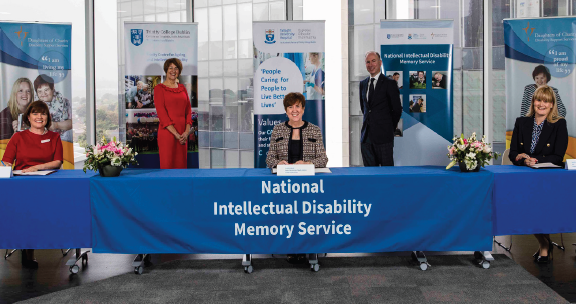Wave 4 Impact Case Studies
Evidence to Action: Responding to COVID-19 Activating Research Infrastructure to Safeguard a Vulnerable Population

When COVID-19 was declared a global pandemic in March 2020, IDS-TILDA researchers had to suspend Wave 4 data collection due to Ireland's public health restrictions. Recognizing the heightened risks for people with intellectual disabilities—especially older adults with chronic conditions—the team quickly adapted. They shared IDS-TILDA data with carers, service providers, and policymakers to highlight specific risks and worked to elevate the voices of people with intellectual disabilities in national COVID-19 discussions. They also advocated for prioritizing this group in vaccine roll-outs and launched a supplementary COVID-19 survey to track the pandemic’s effects on participants. This case study highlights outcomes from IDS-TILDA’s response to COVID-19 and the team’s efforts to advocate for the health and well-being of people ageing with intellectual disability in Ireland.
COVID 19 Response Impact Case StudyEvidence to Action: Mobilising Knowledge for Healthier Ageing Developing Positive Ageing Indicators for People with Intellectual Disabilities

Ireland’s National Positive Ageing Strategy (2013) champions health, well-being, and quality of life for all. Emphasizing dignity, self-fulfillment, and intergenerational solidarity, it recognizes the need for preparedness across sectors to support positive ageing. Goal 4 of the Strategy highlights the use of research to monitor ageing experiences and guide policy. Through the Healthy and Positive Ageing Initiative (HaPAI), Positive Ageing Indicators were created, spotlighting groups with poorer health outcomes, such as Irish Travellers and people with intellectual disabilities. IDS-TILDA researchers helped develop indicators specific to people with intellectual disabilities, enhancing inclusivity and accountability in health policy. This case study highlights the development of the indicators and efforts to address key issues affecting people ageing with an intellectual disability in Ireland.
Positive Ageing Indicators Impact Case studyEvidence to Action: Transforming Health Care Delivery Launching the National Intellectual Disability Memory Service

People with intellectual disabilities face a significantly higher risk of dementia—up to five times greater than the general population, and for those with Down syndrome, risk factors make Alzheimer's nearly universal by age 40. Research indicates that by age 65, those with Down syndrome face an 88% likelihood of clinical dementia symptoms. Symptoms associated with dementia begin at earlier ages for people with an intellectual disability, therefore, efforts to promote brain health and diagnose disease also need to begin at earlier ages. Yet, dementia assessment rates remain low, with almost 50% of those with down syndrome and no diagnosis of dementia never having been assessed. In response, Trinity College Dublin and partners established the National Intellectual Disability Memory Service (NIDMS) in 2020, Ireland’s first dedicated dementia support for this community, to ensure reliable assessment, timely diagnosis, and appropriate care pathways. This case study highlights outcomes, to date, and progress aligned with national and international research and development priorities.
NIDMS Launch Impact Case Study
